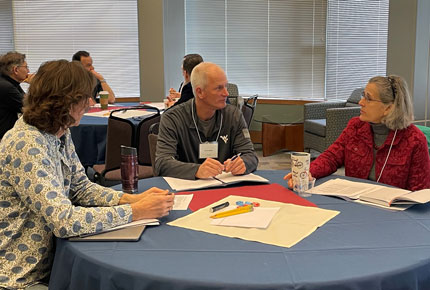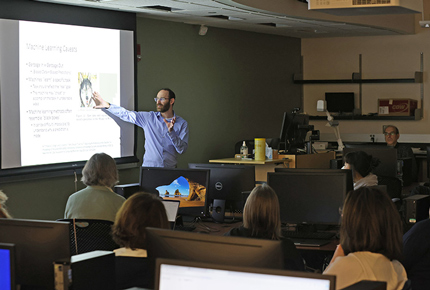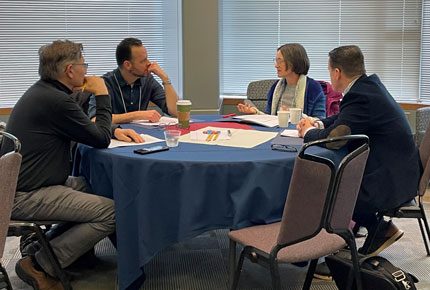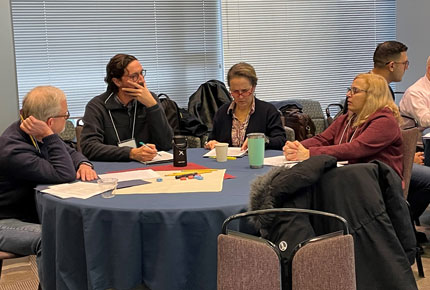Hope in a Time of Monsters: Supporting Faculty and Student Mental Health
(Part of this session was recorded! See below for Link.)
May 22, 1 pm – 4 pm
Presentation by Sarah Rose Cavanagh, Senior Associate Director for Teaching and Learning, Simmons University
Facilitation by Kristalyn Salters-Pedneault, Professor, Psychological Science
Teaching is a vocation. When supported with resources and security, it is a constantly renewing source of excitement and richness. The last several years of disruption, uncertainty, and overburdened workloads have exhausted faculty and students alike. Monsters have reared their heads, and we have understandably shrunk from them. Faculty are burnt out—sacrificing their own mental health, phoning it in out of desperation, or leaving the profession entirely. Students are experiencing an epidemic of mental health problems, especially of anxiety. As instructors, we can support and encourage student mental health through pedagogies of care. A pedagogy of care involves high-touch practices like frequent communication, flexibility, inclusive teaching practices, learning new technologies and techniques, and being enthusiastic and passionate. All these practices involve both a heavy investment of time and a high degree of emotional labor. How can we support our students without burning ourselves out? How can we revive our sparks? In this interactive presentation, Sarah Rose Cavanagh will present some research and food for thought on how higher education should respond to both faculty depletion and the student mental health crisis. The presentation will reference content from her latest book, Mind Over Monsters: Supporting Youth Mental Health with Compassionate Challenge.
Following this talk, you will have opportunities to reflect on and discuss with peers your current practices and course policies, and how you might infuse “compassionate challenge” into your teaching. Please bring one or more of your syllabi to review. You may find it helpful to have a laptop.
Note: Dr. Cavanagh's presentation was recorded! Individuals with an Eastern login can access the recording and materials on the CTLA Sharepoint site.
Infusing Sustainability Into Course Design Across the Disciplines
Led by Patricia Szczys, Executive Director, Institute for Sustainability
Students have embraced opportunities to engage with the ‘wicked problems’ of sustainability in their courses. The pursuit of sustainability goes beyond a direct response to climate change; it examines the historical and modern behaviors, policy, and practices that directly influence the interwoven environmental, social, and economic crises. The UN sustainability framework sets goals that aim to alleviate poverty, improve health, reduce educational and social disparities, spur equitable economic growth, and steward the environment. In this workshop, you’ll learn nine strategies to integrate sustainability into your courses (ELAC or majors courses) and you’ll hear how faculty from different disciplines have done so. You’ll experience hands-on learning activities that address the interdisciplinary nature of sustainability topics and highlight ways in which faculty and students can find meaning in coursework. You’ll have the opportunity to begin drafting an assignment or learning experience for your own course(s) that integrates sustainability and receive feedback from peers.
Please bring a syllabus for one of your courses that you are interested in connecting to sustainability—or a preliminary idea for a future course. You may also find it helpful to have a laptop.
Designing Meaningful Assignments
May 21, 2024, 9 am – 12 pm
Led by Courtney Broscious, Associate Professor of Political Science
Designing LAC 101 Learning Experiences to Address ELAC Learning Outcomes
Led by David Pellegrini, ELAC Seminar Coordinator and Professor of Theatre
This fall, 30 sections of LAC 101 will run for the first time. Upon completion of this seminar, students should have a foundational understanding of each of the five ELAC learning outcomes and be able to articulate the value of a liberal arts education and an understanding of the skills and practices involved in the liberal arts. But how will faculty design classroom activities and assignments that help students develop this understanding? In this workshop, you’ll hear from faculty who have given some thought to learning experiences that introduce, address, and measure each learning outcome. You will have the opportunity to work in a small group with other faculty to develop a lesson plan and assignment around a specific learning outcome. You’ll have time during the session to begin work on an assignment or in-class experience and get feedback from your peers. You will also be given access to what will become a repository of assignments designed by Eastern faculty to address all of the different learning outcomes. This workshop will also be helpful if you are considering developing seminars at the 100, 101 and 200 levels in the coming academic year. You may find it helpful to bring a laptop.
Faculty who share their work-in-progress at the end of the session and commit to sharing a final draft by June 21 for upload to the repository will be eligible for a $250 stipend. Faculty will be asked to participate in a one-hour virtual resource sharing event in late June to discuss the assignment/ experience they have designed.
Understanding AI and ChatGPT: A Hands-on Workshop
Wednesday, February 28, 3-4 pm, Science 115
Led by Garrett Dancik (Computer Science)
Are you interested in understanding more about how ChatGPT and other Large Language Models (LLMs) work? Have you wanted to spend time learning to use one of these generative Artificial Intelligence tools, but didn’t quite know how to get started? In this workshop, Garrett Dancik will give a 30-minute overview of how LLMs work, what these tools can and cannot do, and what can go wrong. Participants will then have 25 minutes to experiment with ChatGPT, including creating and refining prompts relevant to their teaching. Staff from CIT will be on hand.
Read an article about this workshop.
Workshop on High Impact Practices
January 10 and 11, 2024, from 9 am to 1 pm on both days
The ELAC Seminar and Disciplinary Perspectives Coordinators are offering a professional development workshop through the CTLA focused on high impact practices (HIPs). This workshop is intended for faculty members who are interested in incorporating HIPs in their teaching, including in ELAC Seminars and Disciplinary Perspectives courses.
The workshop will run from 9 am to 1 pm and include lunch on both days. Participants will be compensated in the amount of $300. Registration is limited to 25 faculty. Currently accepting registrations from full-time faculty, as well as part-time faculty who will be teaching ELAC courses in the fall.
The workshop will focus on the following questions:
- What is the research behind High Impact Practices?
- What are the eight key elements that make HIPs truly high impact?
- How can Eastern faculty incorporate HIPs in course design?
- What is the importance of equity in the HIP design?
Participants will engage interactively with model high impact practices, including Collaborative Projects and Assignments and Undergraduate Research.
The workshop will also feature:
- A discussion on Sustainability and its relevance to student engagement and adoption of HIPs across disciplines & Thematic Clusters across ELAC.
- Examples from faculty on how they have developed HIPs for their courses, including using strategies such as scaffolded assignments.
After the conclusion of the workshop, participants will be asked to continue developing a plan for incorporating a HIP in one of their courses and then share their plan with other faculty (e.g., at a department meeting or an event in the spring).






